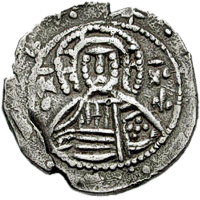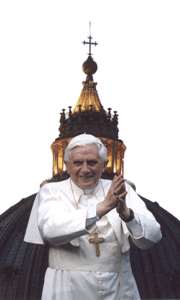Pontiff, Palaeologan, Persian
Posted by Eric (September 22, 2006 at 1:40 pm)
 In all this hubbub over Pope Benedict XVI’s speech at Regensburg, there are a few unanswered questions:
In all this hubbub over Pope Benedict XVI’s speech at Regensburg, there are a few unanswered questions:
1. Are any of those who have told us the Pope gave a speech attacking Islam, condemning violence by Islamic extremists or condemning any use of violence in furtherance of religion ever going to read it?
Benedict XVI gave a speech about the relationship between reason and culture, and the necessary connection between reason and faith—arguably the overarching theme of his entire career as both an intellectual and a shepherd of souls. He gave reference to Byzantine Emperor Manuel II Palaeologus’ dialog with a “learned Persian” about Christianity and Islam because it was relevant—not only to the topic of faith and reason (where Christianity and Islam differ) but to the day (when Christianity stands between the foes of secularism and Islam).
After the introduction wherein he refered to Manuel’s dialog, Benedict focused on the narrowing concept of reason in the West, which he traces all the way back to the middle ages, which leads to the decay of reason itself. He paid particular attention to the providential fusion of Jewish faith and Greek thought—which makes his reference to an intellectual debate by one of the last Byzantine emperor all the more relevant.
 But we’ve been told that Benedict gave a talk “on Islam.” I suppose they would also tell us that the topic of Abraham Lincoln’s “Gettysburg Address” was arithmetic.
But we’ve been told that Benedict gave a talk “on Islam.” I suppose they would also tell us that the topic of Abraham Lincoln’s “Gettysburg Address” was arithmetic.
Even some who think they’ve read it, haven’t. We’ve been told that Benedict failed to separate his own thought from Manuel’s charge: “Show me just what Mohammed brought that was new, and there you will find things only evil and inhuman . . .”—as if the gentle, scholarly Pope with a record four-decades long really needs to clarify where he stands. And yet, he did, attributing to Manuel “a brusqueness which leaves us astounded.” Astounded.
2. Who was Manuel II Palaeologus anyway?
I saw very little more about this man in the media—mainstream and new—except that he was one of the last Byzantine Emperors. So I looked him up on Wikipedia and discovered that as a youth he had served as an honorary hostage in the court of the Ottoman Sultan and actually had to participate in the destruction of the Byzantine city of Philedelphia.
This was a man who knew Islamic culture intimately, from the inside. He was also presided over some of the final days of the Byzantine Empire—covering an area during his reign so small that the term “empire” seems facetious—which was finally collapsing after centuries of warfare with successive Muslim regimes.
The vast Byzantine Empire that for a thousand years had cradled both the Christian faith and the Wisdom of the ancient Greeks was dying; and millions whose forefathers had been Christian were now Muslim—and not because they found the arguments of Islam more compelling, which is precisely what Manuel II argues in his dialog with the “learned Persian.” Which gives rise to another good question:
3. Who was the “learned Persian” with whom the “erudite emperor” dialoged?
I don’t think history records the name of this man, but there is still something to be learned about him from the very fact that Manuel II engages him in a lengthy dialog about Christianity and Islam. He was not, appreantly, too terribly outraged by Manueal II’s suggestion that Islam is “evil and inhuman.” Wikipedia tells us that statement—actually a question—came from the seventh of twenty-six dialogs. The Persian was, at least, not too upset to continue with the subsequente nineteen dialogs.
As for Manuel’s question itself, how about it?
4. Precisely what did Mohammed bring that was new?
From the perspective of a Christian, it looks like Mohammed offered nothing but a simplification of theological ideas and moral precepts derived from Judaism and Christianity. So what exactly did Mohammed offer that was new?
I guess that was a question that one could ask way back at the turn of the Fifteen Century. Now, at the begnning of the Twenty-First Century, we are required to pretend that they dignity of Islam is self-evident.
Meanwhile, Christianity is assumed to be irrational and irrelevant, until proven otherwise, by a society that can’t even take the trouble to read a statement in its defense, such as that offered by Pope Benedict XVI in Regensburg.


So after he had washed their feet, and had taken his garments, and was set down again, he said unto them, Know ye what I have done to you? 13: Ye call me Master and Lord: and ye say well; for so I am. 14: If I then, your Lord and Master, have washed your feet; ye also ought to wash one another’s feet. 15: For I have given you an example, that ye should do as I have done to you. 16: Verily, verily, I say unto you, The servant is not greater than his lord; neither he that is sent greater than he that sent him. 17: If ye know these things, happy are ye if ye do them. 18: I speak not of you all: I know whom I have chosen: but that the Scripture may be fulfilled, He that eateth bread with me hath lifted up his heel against me. 19: Now I tell you before it come, that, when it is come to pass, ye may believe that I am he. 20: Verily, verily, I say unto you, He that receiveth whomsoever I send receiveth me; and he that receiveth me receiveth him that sent me. John 13:12-20
Comment posted September 26th, 2006 at 10:05 pm
I am not sure what the point of the above scripture citation is.
ERIC-how about telling us all about the “Contraception is not the Answer” column.
I just wish I were young enough to not-contracept with some effect! But alas, I am 57 and the youngest of my nine children is 17.
In Christ,
Susan Peterson
Comment posted September 27th, 2006 at 2:42 pm
Eric,
I am glad to hear you will be giving a talk at our Parish on Sat, Oct 14th at 9AM after 8AM mass! My Parish is Sacred Heart in Lombard. Unfortunately I cannot make it because I work on Saturdays.
Anyhow I received a mailing which stated you had a new CD come out about NFP. I think it stated how NFP made a big change in your life. I cannot find that piece of mail. Is there a website I can go to in order to buy a copy of your cd?
Thank You,
Pete
Comment posted October 5th, 2006 at 6:27 am
Pete—The talk on the CD you mention isn’t really new; it was delivered five or six years ago. But the talk was recently added to the catalog of materials at One More Soul here.
Comment posted October 5th, 2006 at 12:15 pm
Erik;
The one thing that bothered me over the whole issue of Pope Benedict’s talk, was that many hear in the West were urging him to apologize. I couldn’t see it one, because he was only quoting someone else, and two, why should someone have to apologize for the truth.
Personally, I think that whenever President Bush or any of our other politicians come out and keep telling the American people that Islam is a peaceful and loving religion that has been hijacked by terrorists, is doing the American people a great disservice, and they certainly do not know the history of Islam.
And to those, here in America and those in Europe who feel that we should negotiate with Iran and Syria, concerning Iran, all I can say is: “How do you sit down to negotiate with people who are dead set on your destruction? How do you negotiate with people who feel that they have a right and duty to lie to non-Muslims in negotiations? What would we have to use as a basis to negotiate with them, when all they want is our destruction?” Iraq wants us out of Iran so that they can move in, but many of our politicians, especially the Democrats, can’t seem to understand that.
I am not under the Holy Father, but I do admire him for his strong stand and convictions. As we in the Orthodox Church say: “EIS POLLA ETI, DESPOTA” (Unto many years, O Master).
Fr. Abouna Gregori
Comment posted November 19th, 2006 at 2:48 am